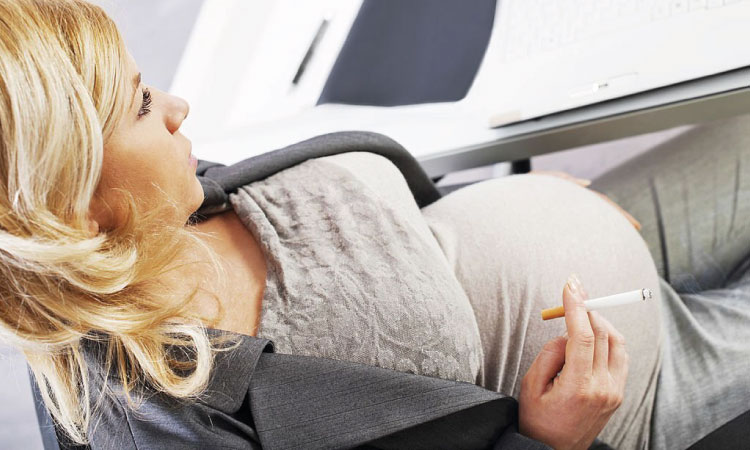It is common knowledge that smoking is bad for your health because it increases your risk of developing cancer, lung disease, and heart disease. The harmful effects of smoking on fertility and reproductive health, however, isn’t widely known. In addition to harming your lungs, cigarettes also contain toxins that can harm your reproductive organs. Quitting smoking is one of the most effective ways to increase your chances of getting pregnant. Women who stop smoking significantly increase their chances of getting pregnant1. How does smoking affect conception? Does smoking affect implantation? To learn more, continue reading.
Smoking And Pregnancy: A Few Facts To Keep In Mind
- No amount of smoking is considered safe
- Cigarette smoke contains chemicals that are harmful to both sperm and eggs
- It takes longer for both men and women who smoke to conceive a child compared to those who do not smoke
- Second-hand smoke is nearly as harmful as smoking
- When a woman is exposed to second-hand smoke, it takes her longer to conceive
- When compared to non-smokers, smokers need almost twice as many IVF attempts
- Because smoking damages the DNA in eggs and sperm, there are more miscarriages and babies born with birth defects among smokers. Smoking is also linked to more spontaneous miscarriages in both natural and assisted pregnancies
Smoking Before Pregnancy: Risks
Smoking during pregnancy has many harmful risks. Even with as few as 1 to 5 cigarettes per day, maternal smoking before pregnancy increased the risk of multiple congenital birth defects. Congenital diaphragmatic hernia, limb reduction defect, cleft palate, cleft lip with or without cleft palate, gastroschisis, and hypospadias are some examples of birth congenital anomalies that can result if a woman becomes pregnant before she has completely kicked the smoking habit2.
Our panel gynaecologist Dr Ankita Patel Tayal explains that because smoking damages the genetic material in eggs and sperm, miscarriage and offspring birth-defect rates are higher among patients who smoke. Smokeless tobacco also leads to increased miscarriage rates. Women who smoke are more likely to conceive a chromosomally unhealthy pregnancy (such as a pregnancy affected by Down syndrome) than nonsmoking mothers.
Even after the mother quits smoking during one of the subsequent trimesters of pregnancy, the baby will still have an increased risk of being born with a congenital abnormality. In light of these findings, smoking cessation programs must be put into place months before a woman tries to become pregnant.
11 Harmful Effects Of Smoking On Fertility And Reproductive Health
Men and women who want to start a family should avoid smoking for a variety of reasons. Much research has been conducted on the long-term effects of smoking on reproductive organs and fertility. According to the source, smoking has a negative impact on both men’s and women’s fertility.
The following are 11 harmful effects of smoking on fertility and reproductive health of both men and women:
Calculate Due Date With Conception Date
1. Smoking accelerates ovarian egg (oocyte) death
In contrast to males, who continue to produce new sperm throughout their entire lives, females are born with all of the eggs they will ever have. It is not possible to undo the damage that has been done to the egg reservoir. Once those eggs have been damaged, they cannot be repaired. Cigarette smoke contains chemicals (such as nicotine, cyanide, and carbon monoxide) that speed up the loss of eggs. Once eggs are lost, they cannot be replaced. Thus, smoking may decrease the number of eggs present in a woman’s ovaries, as well as prematurely age her ovaries3.
Dr Ankita Patel Tayal, MD OBGYN, says that smoking also impacts fertility treatments such as IVF. A woman who smokes is less likely to become pregnant and give birth via IVF than a non-smoker. This is because women who smoke have fewer eggs for retrieval.
2. Smoking causes problems with the fallopian tubes

According to the findings of a recent study, a woman’s risk of developing the pelvic inflammatory disease, which is a severe infection of the fallopian tubes, appears to be twice as high when compared to the risk faced by non-smokers. This is due to the fact that the lining of the cervix of female smokers contains a lower number of white blood cells than the lining of the cervix of non-smoking females. This impacts on the ability of the women to fend off infections like PID. Fallopian tubes can become scarred and blocked by PID. It interferes with the normal movement of the egg along the fallopian tube.
Related Reading: 6 Ways To Reduce The Risk Of Stillbirth
3. Smoking brings about cervical changes.
A greater likelihood of developing cervical dysplasia is associated with cigarette smoking4. Cervical dysplasia is characterized by abnormal cells on the cervix. Cervical dysplasia can range from a relatively minor condition to a more serious one, depending on the characteristics of abnormal cells. Although cervical dysplasia does not cause infertility or difficulty becoming pregnant, it can cause cervical insufficiency, leading to widening and thinning of your cervix before the pregnancy is complete.
4. An increased chance of contracting HPV
Smoking has a negative impact on your immune system. Cigarette smoking has a negative impact on the immune system’s ability to combat HPV. Thus, women who smoke have a higher risk of developing an HPV (human papillomavirus) infection over time5. This virus has been linked to genital warts, precancerous lesions, and even cervix and genital cancer. HPV infection is more likely to cause precancer or cancer in people who smoke compared with non-smokers.
5. Increased risk of cervical cancer
Also, there is evidence that women who smoke have high levels of nicotine and other substances that cause cancer in their cervical mucus6. These chemicals, known as carcinogens, have the potential to harm the DNA in cervical cells. The damage caused by smoking to the cervical cell genes cannot be repaired because HPV blocks our cancer-fighting genes. This increases the risk of cervical cancer. There is a chance that treatment for cervical cancer may cause side effects that affect fertility. More often than not, it hinders pregnancy or carries a child through pregnancy.
Related Reading: 7 Best Foods To Increase Fertility
6. Increases the risk of ectopic pregnancy
Ectopic pregnancies can be up to four times more likely in women who smoke. Epidemiological research shows that smoking cigarettes are one of the biggest risks for tubal ectopic pregnancy7. According to researchers, female smokers have higher levels of PROKR1 in their fallopian tubes, which can lead to an ectopic pregnancy. Cotinine, a chemical found in cigarette smoke, has been found to potentially cause a reaction that escalates PROKR1 levels in the fallopian tubes. When there is an excess of this protein, the muscles that line the inside of the fallopian tubes are unable to contract. This, in turn, impedes the movement of the egg from the fallopian tubes to the uterus, which can result in ectopic pregnancies. In some cases, an ectopic pregnancy can cause the fallopian tube to rupture, which can result in internal bleeding and future fertility issues.
7. Influences estrogen levels.
Nicotine from cigarettes can stop the aromatase enzyme from working, which changes testosterone into estrogen. Therefore, nicotine lowers levels of estrogen in the blood. Low estrogen levels can inhibit ovulation and make conception difficult, resulting in infertility.
8. Increases the likelihood of endometrial hyperplasia

The lining of the uterus gets thicker in endometrial hyperplasia, which can cause heavy or unusual bleeding. People who smoke have a higher risk of developing endometrial hyperplasia8. It is possible that either the condition itself or the treatment for it could make it more difficult to conceive a child9.
9. Smoking can increase the risk of erectile dysfunction
Erectile dysfunction is the persistent or recurrent inability to achieve or maintain an erection firm enough for satisfactory sexual intercourse. Smoking increases the risk of erectile dysfunction10. As a result of smoking, plaque builds up in the arteries. (atherosclerosis). This obstructs blood flow through vessels. Erectile dysfunction occurs as a result of insufficient blood flow to the penis. Compared to men who never smoked, those who smoked more than 20 cigarettes a day had a 60% higher risk of developing erectile dysfunction11.
Related Reading: Garlic And Fertility – How To Use The Herb For Best Results
10. Smoking impairs sperm health
When compared to those who do not smoke, men who smoke tend to have lower sperm quality, lower sperm count, and lower sperm motility. Smoking has a negative impact on sperm morphology. When we talk about sperm morphology, we’re talking about the way sperm looks. The number of abnormally shaped sperm also increases due to smoking. Sperm with an unusual shape may not be able to swim effectively enough to reach the egg and therefore may not be able to fertilize an egg.
Some studies even show that men who smoke are more likely to have sperm with genetic flaws. A sperm’s ability to perform its function is diminished if it has genetic damage. When the sperm fails to fertilize the egg, the woman is unable to get pregnant.
11. Smoking affects implantation
It is difficult for women who smoke to conceive and maintain pregnancies. In addition to reducing uterine and endometrial vascularization, tobacco compounds inhibit myometrial relaxation. This increases the risk of miscarriage and causes implantation failure12.
How Long After Quitting Smoking Does Fertility Improve?
The good news is that the effects of quitting smoking on fertility can be noticeable within a few weeks or months. However, it may take up to a year to reverse some of the effects of smoking.
Related Reading: Drinking Red Wine During Pregnancy- Pros And Cons
No matter how long a man has been a smoker, the moment he puts down the cigarette, the quality of his sperm will improve dramatically. The maturation process for sperm typically takes around three months to complete. Therefore, it is recommended that individuals wait at least three months after quitting to undergo sperm quality testing. If a man quits smoking at least three months before trying to conceive, his sperm will be in much better health, and he will have a better chance of successfully fertilizing an egg and having a healthy baby.
When it comes to women, the positive effects of quitting smoking can be seen in their eggs just three months after the cessation of smoking. Tobacco cessation has a positive impact on women’s fertility, but it takes longer than for men. Smoking cessation does not restore a woman’s ovarian reserve, but it can improve her fertility in other ways. For women, it may take a year to recover from the long-term effects of smoking cigarettes13.
Conclusion

When it comes to infertility, information is everything. Unfortunately, the majority of the population is unaware of the dangers that smoking poses to one’s fertility. Smoking cessation can be extremely challenging, but working with a medical professional or a support group increases your chances of success. It’s possible to use nicotine replacement therapy (such as a nicotine patch or gum) or a prescription drug called bupropion to help you quit smoking. Even E-cigarettes may help to quit the habit of smoking. But only move forward if your doctor gives you the all-clear. Even though it is generally not recommended to use these while pregnant, many of these may help to quit smoking during pregnancy as well. It’s up to you and your doctor to weigh the advantages and disadvantages of taking them while you’re pregnant and come to a decision.
FAQs
Exposure to second-hand smoke in the household is bad for female fertility. Those who are exposed to second-hand smoke are at risk for all of the aforementioned health problems.
The more you smoke, the more sperm and ovum get affected. For men’s and women’s fertility, smoking 20 cigarettes daily appear to be more harmful than smoking only one or two cigarettes every now and then.


